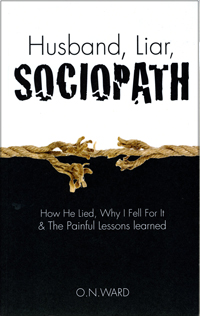 Just about every day, Lovefraud receives e-mail from readers who are looking for answers about confusing, contradictory and abusive behavior exhibited by people in their lives. The new readers don’t understand what they are dealing with; they just tell, either in a few paragraphs or lengthy compositions, their stories. The e-mails describe some or many of the following behaviors:
Just about every day, Lovefraud receives e-mail from readers who are looking for answers about confusing, contradictory and abusive behavior exhibited by people in their lives. The new readers don’t understand what they are dealing with; they just tell, either in a few paragraphs or lengthy compositions, their stories. The e-mails describe some or many of the following behaviors:
- Pathological lying
- Pity plays
- Shallow emotions
- Devalue and discard
- Cheating or promiscuity
- Addiction to drugs or alcohol
- Controlling demands
- Financial irresponsibility
- Manipulation of children
- Broken promises
- Claims of “you made me do it”
- Pleas of “I’ll never do it again”
The readers ask, “Am I involved with a sociopath?”
For those of us who now know what sociopathic behavior looks like, it is apparent that the answer is yes—or that at least the readers are describing sociopathic traits.
More than 5,000 people have contacted Lovefraud with their stories—and others have told their stories in comments posted on this blog. In all of them, the same behavior patterns are described over and over again. In fact, many of you have wondered (facetiously) if you were all involved with the same person.
Asking for advice
When newbies, who have been confused by lies and broken promises, learn that there is a personality disorder that describes what they’ve been dealing with, they have a few reactions. One is relief that they are not crazy—they really are experiencing irrational demands and covert manipulation.
Another is horror at the magnitude of the problems they face—especially upon learning that there really isn’t any treatment for a sociopath. With that, the new reader starts asking for advice, and this is where things get tricky.
Here are questions that I’ve been asked:
- He’s threatened to kill me—will he do it?
- How do I get the judge to see the truth?
- How can I get the authorities to arrest her?
- How can I protect my children?
- How can I get my money back?
- What should I do?
As much as I wish that any of us who are further along the road of understanding could answer these questions, the reality is, we can’t.
Each situation is unique
Although we often see the same patterns of behavior, each sociopath is unique. Each victim is unique. Each situation is unique. As victims try to extricate themselves from entanglements with sociopaths, any and all of these issues may be pivotal:
- How much clout does the sociopath have in the community?
- How well can the sociopath manipulate the legal system?
- How much money does the sociopath have to throw into the conflict?
- Who believes the sociopath?
- Who can the sociopath make into allies?
- Are there any witnesses? Will they speak up?
- How old are the children?
- What office politics are involved?
- Do legal authorities take the case seriously?
- Are there any ties that can’t be broken?
- How much money does the victim have (remaining)?
- How much strength does the victim have to continue the battle?
Sometimes I feel so helpless. I can offer some generalizations about what sociopaths tend to do—based on the 5,ooo cases I’ve learned about—but I cannot predict what any particular sociopath will do, how authorities may react, or if anyone will see through the deceptions. All of this makes it very difficult to give advice.
Solitary journey
In reality, extricating ourselves, recovering from, and coming to terms with the sociopath(s) in our life is a solitary journey. Other people may make suggestions, but we must ultimately make the decisions on how to cope.
And sometimes the range of the choices we have the ability to make is very narrow. A judge may decide on joint custody of children, or even award custody to the sociopath. Law enforcement may decline to investigate or prosecute. If we win our case in civil court, we may never collect a judgment.
In situations like these, decisions are taken away from us.
When that happens, our only choices have to do with our own attitude. Are we going to let the sociopath sink us? Or are we going to somehow find a way to heal?
Real response is internal
There is great wisdom in the adage, “This, too, shall pass.”
It’s been almost 20 years since I left my sociopathic ex-husband. I’ve processed most of the emotional trauma associated with the experience, so it doesn’t have the grip on me that it once did. In fact, if it weren’t for the fact that I’m running Lovefraud, it would have no grip on me at all.
Twenty years ago, I was on the phone with another woman scammed by my husband multiple times a day. Although we are still friends, now we rarely speak. She’s moved on in her life—the experience is a distant memory.
The same thing happens here at Lovefraud. In the midst of their trauma, readers post frequently. But eventually we stop seeing their names and comments. I hope that means they’ve left the experience behind.
In the end, the real response to the experience with the sociopath is internal. We have to come to terms with the betrayal, the injury, the exploitation. So although it’s hard to give foolproof advice for dealing with the circumstances that the predator creates in our lives, the truly important advice is this: Find a way to heal yourself.
Lovefraud originally posted this article on March 30, 2009.




































 Sociopaths Lack Empathy–Even For Their Own Children
Sociopaths Lack Empathy–Even For Their Own Children
kendall68
Hi Donna
Happy Valentine’s Day!
Those of us who don’t post are probably still reading your entries, learning more, understanding more and still adjusting. In particular if we have children with the Psychopath or semblances of children with the psychopath because we never see them. Our struggles continue with the psychopath past agreed orders that continue to never be followed. As stated they transfix the world around them, create chaos and leave us in a constant state of despair except that we can understand what they are going to do prior to them doing the next thing to destroy us.
Your postings are what keep me going. I still read them every Tuesday and sometimes an article which peaks my interest allows me to follow up on more research about that one aspect of the psychopath. Understanding psychopathic behavior is the savior in this. Understanding that one is not alone and someone else understands is a blessing.
The hardest thing is that although we the victim know so much about psychopathy and the psychopath those around us don’t and won’t accept it. It is hard to say that those people who should be supporting us (court judges, lawyers, police, social workers) are duped or are mere carbon copies of the psychopath.
I hear that violence is unacceptable but when going through the court system you the victim realizes that this isn’t true. My personal opinion is that most of the people in power, who have all the power/authority and money and control in the world are psychopaths themselves and like wolves pack together with the psychopath and help him in taking you down. A clinician agreed with me about this.
The state of the world is currently in chaos. Dark energy since it’s discovery in the 1980’s has increased to 69% in the universe. Does this in itself lend to why psychopathy is a growing condition in society and acceptable? I question how many empaths are still in existence on this earth and are we being singly eradicated by these predators one by one for sport?
Your articles are still read weekly and keep me grounded even though the psychopath in my life won’t stop until I no longer exist. We are all energy and we the empaths have to band together like they do. This group is one way we still can. It is like an underground meeting place for the victims and arms us for the next fight.
Donna Andersen
kendali68 – thank you so much for your post. It is so important that we understand that psychopaths are out there – and they are everywhere. (Yes, plenty in the court system.) The better we get at spotting them, the more we can protect ourselves – and overcome the evil.
It Takes 2
Giving advise is hard because it’s not readily known where the victim is emotionally at that particular moment in time. For me, once I heard the word Sociopath and went to look it up, it took 3 months to accept that that was describing the Devil I had become tangled with. I finally accepted that S’s were real people that existed.
Then it took at least 1 more year of constantly reading Lovefraud and other healing sites to pull my head and heart back together again. No Contact was difficult because I was being hovered on a regular basis. It about broke me. But I’m 2 years NC now and life is good again.
Helping someone begin the journey to heal can be frustrating for a while. But I still won’t hesitate to help plant the seed of knowledge because someone did it for me and eventually over time I came to understand what they were trying to do for me. And for that I’m very grateful.
AnnettePK
This is a really good analysis of some of the numerous factors and elements that make up every unique situation. The points made clearly come from a lot of experience helping victims. The Lovefraud site has been and continues to be a literal life saver for so many victims. The opportunity to share with others who understand and who care is as helpful as the very good advice victims also find here.